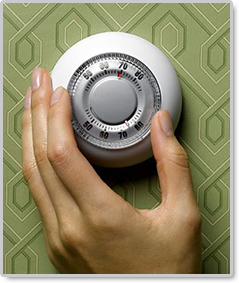Adapting to One Degree Less Air Conditioning

If you increase the thermostat for your air conditioning by just one degree, you can save between 1-3% of your total annual energy bill. So example, if your annual electric bill is $2000 per year, then you can save $40 by making this small change. According to Energy Star, the optimal temperature setting for air conditioning is 78 degrees. If you move it to 79 degrees, you may not even notice the difference. And for the few times that it is uncomfortable for your family, you may find that you can adjust to these periods by just making small changes in your lifestyle.
In a typical home, your air conditioning system uses the most electricity of anything in your home: between 16% and 20% of your total electric bill. In warmer parts of the country, your air conditioning bill can even comprise up to two-thirds of the energy bill.
So if you are looking for ways to reduce your electricity use (and reduce your home's carbon footprint), then reducing your home's air conditioning needs is a good place to start.
To help you adapt to this one-degree change in temperature, here are some tips for you:
Close window blinds during the day: Closing your blinds during the hottest times of the day can save you up to $100 on your annual energy bill. You should especially try to close the blinds on your windows on the south and west sides of your home, as these will get the most direct impact from the sun.
Use a ceiling or room fan with your AC: If you use a ceiling or room fan in conjunction with your air conditioner, you can decrease your annual cooling costs by around $15. A ceiling fan uses only 75 watts/hr of energy, compared to 3,500 watts/hr for an average central air conditioning system, and 900 watts/hr for a window air conditioner unit. The moving air from a ceiling or room fan can make you feel 3 to 8 degrees cooler. If you have a ceiling fan and it will allow, then in the summer you should run it in the direction that draws air upwards in the room, rather than pushing warm air down (see types, costs, and reviews of: ceiling fans; room fans).
Wear clothes made of light-weight fabric: When you are at home on hot days, wear clothes made from light-weight fabric. This will help you adapt to the one-degree rise in temperature. And you might want to adjust your clothes fashions to include more shorts and tee shirts.
Use an AC timer for your Window AC unit: Contrary to popular belief, leaving your air conditioner on for the entire day, so that it doesn't have to work harder to cool a hot house when you get home, will actually increase your energy bill. But if your goal is to have your home cool for you when you get home, you can install a programmable thermostat for your central air conditioner, then you can program it to suit your convenience. For a window air conditioner that doesn't already have a self-timer, you can purchase a plug-in digital timer for less than $10. This small investment can pay for itself with what you will be saving on your cooling costs (see types, costs, and reviews of: programmable thermostats; plug-in digital timers).
So try this fairly simple and easy tip of increasing your thermostat by one degree, and use the tips above to adapt to this change. You can then enjoy reducing one of the biggest impacts on your home's electric bill.
Related Articles . . .
Programmable Thermostats Only Save If Used Right
Programmable thermostats can be a great way to save you money on energy, however, they can only provide savings when they are used properly. Find out how programmable thermostats work and the right way to use them.
Where Your Home Energy Dollar Goes
Ever wonder where your energy dollars go in your home? This article shows you at-a-glance, so that you can focus on the areas that will give you the biggest bang-for-the-buck for reducing your home energy bill.
How to Save $20 on Energy in April (or May)
This article and video describe very easy things that you can do, that will save you $20 on your energy bill during the months of April or May. And the nice thing is that these are all tips that you can do at little or no cost.
Why NOT to Get a Home Energy Audit
Having a home energy audit done by a qualified professional can show you how to reduce your home’s energy bill by up to a whopping 30%. But what are the reasons that you should NOT get a home energy audit?
14 Ways to Keep Cool AND Save Energy This Summer
Want to keep cool this summer and save money on your air conditioning bills? Here are 14 helpful tips. Some of these tips don't even cost any money!
Stop Paying for Electricity 'Vampires'
They are lurking in your home, and they attack while you are sleeping, when you leave . . . well basically, they attack all the time. It's the devices which continue to suck power, even when you have their switches turned off.
Guide to Choosing & Changing HVAC Air Filters
For saving energy and improving air quality, changing the air filters for your furnace is important. This article discusses: why you should change your air filter; how often to do it; how to choose the right filter; and how to do-it-yourself.











